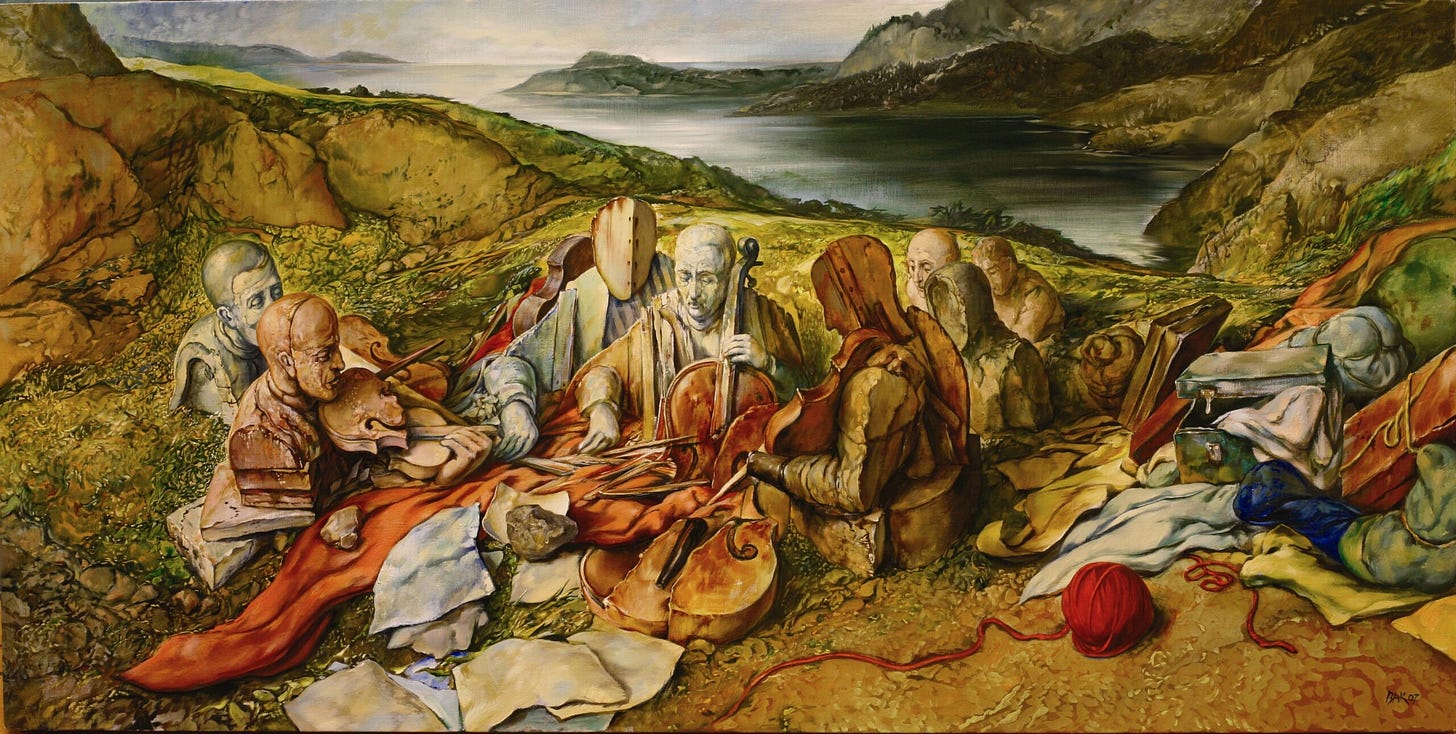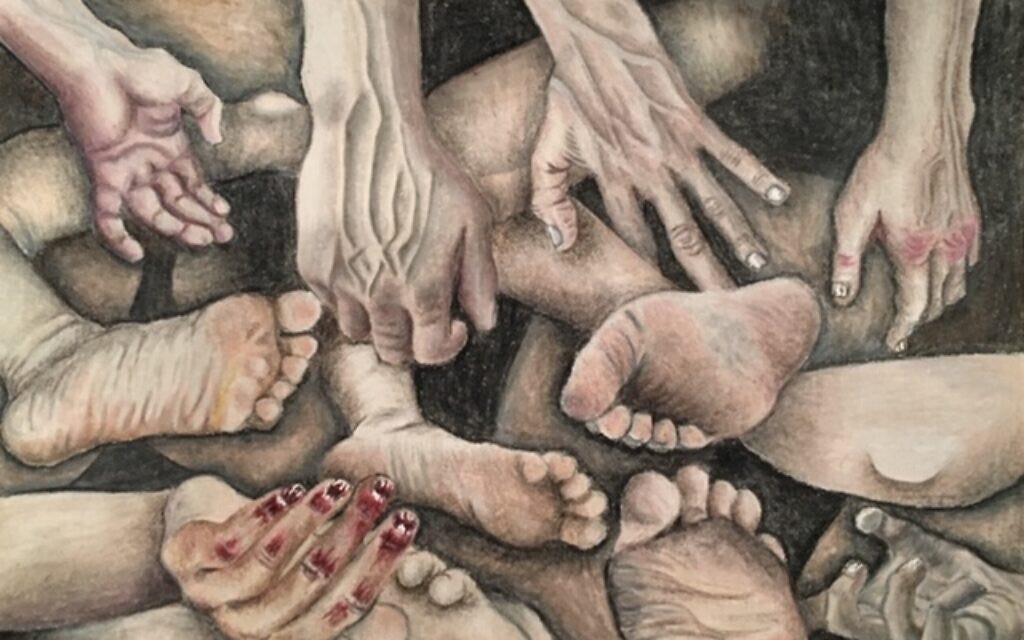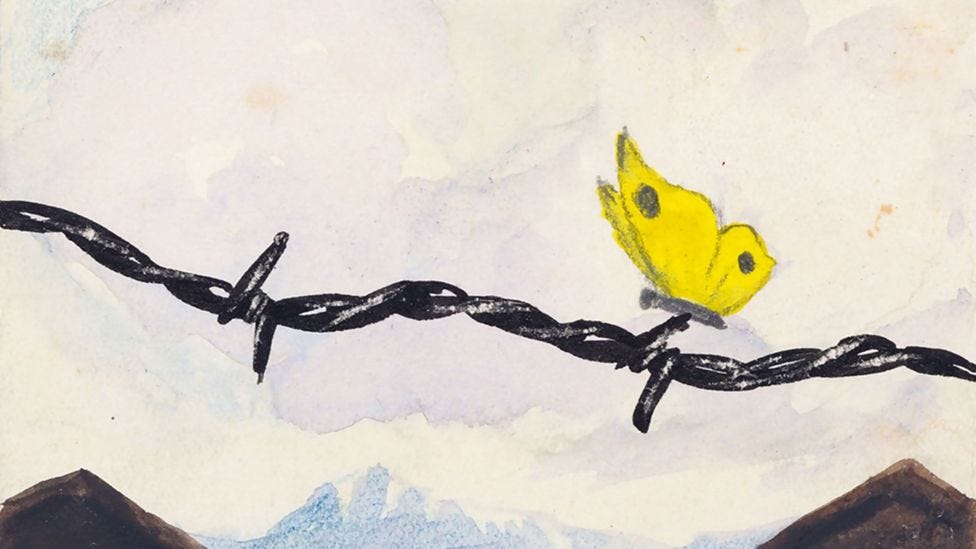The Subversiveness of Art
How story changes everything.
We need more storytellers.
In Gladwell's newest book, The Revenge of the Tipping Point, he discusses overstory, a metaphor he employs and returns to throughout the book. An overstory is a term that refers to the canopy of a forest that absorbs the much-needed sun and casts a shadow on everything below. The ability for new growth to take place is diminished.
This is a metaphor he uses throughout every story he tells. Gladwell has a unique cadence to his writing. He weaves in and out of generally unfamiliar stories, but even the ones we do recognize, he tends to focus on the facts people don’t always see at first glance. Most people read the same stories and pass on to the next headline without much thought.
One of those stories in The Revenge of the Tipping Point is the creation and normalization of the word Holocaust. He tells of how most Americans in the post-war era were largely unaware of what took place in the death camps of Hitler’s Germany. Many people knew, but as Gladwell explains, that the difference between something being known and widespread is in what he calls the magical 25%. Most people didn’t know because it took fifty years to go from zero awareness to finally surpassing the 25% necessary for something to become part of the national consciousness. People knew about the Holocaust, but it was well below the threshold of what he identifies as the 25% necessary for creating a tipping point in any institution or nation.
Gladwell says that the path to 25% is often slow, and it feels like you will never get to the tipping point where what you are pushing for becomes a reality. He points out that it wasn’t until the 1980s that the US had its first Holocaust museum, nearly 50 years after the end of the war. Why is that? Because in the US, we had not reached the tipping point of the horror and reality of what Hitler had done.
Why? Because it was so awful, many people would not speak of it, and those who did hear it found it hard to believe because the true stories told were so barbaric they felt like a lie. The stories that were told had to be a lie. But they weren’t. They were all true. This silence on the story of the Jews was an overstory that cast a dark shadow on our country.
What created the tipping point? Art. Words. Subversive words. True words.
Up until 1980, the word “holocaust” with a small “h” was used, but not often. The word “Holocaust,” with a capital “H,” was nearly non-existent. That changed in 1978, but why? Gladwell points out in his book that it was due to many factors working together but really because of one thing—a tipping point if you will.
Two Jewish men decided it was time to tell the world of the horrors of the Nazi final solution. They were movie producers, and they created a miniseries based on a Jewish family and their experience in Hitler’s Germany. This artistic endeavor was the final straw that created a tipping point for us in our understanding of the horrors of Nazi Germany. The artistic storytelling challenged the overstory of shame, unbelief, and silence that had cast a dark shadow. 120 million people, half of the country, tuned into this four-part telling of what took place in places that were before unthinkable and unspeakable.
“The two TV executives didn’t hedge their bets and tiptoe around the subject they created one of the most devastating and unflinching history seminars in modern history.”
This mini-series affected the US, and its ramifications were felt worldwide as it acted as an ax at the root of the tree-covered overstory that had cast its shameful, silent shadow on us all.
“In the earlier discussion, the scripts were titled Holocaust, but when the scripts were finished, that word had been dropped. It had no special meaning in the mid 1970’s after all.” The TV executive in charge of this production recounts, “One day there arrived at my door a stack of scripts this high and I made one contribution to it. I read the scripts, but I noticed the script wasn’t called Holocaust. It was called The Family Weiss, which is the name of the family that goes through the Holocaust in the series and I said we don’t want to call it The Family Weiss. Call it Holocaust (Chomsky, 1978).”
Gladwell goes on to say that is why we now call the Holocaust the Holocaust.
“The mass atrocity that no one wanted to talk about now had a name, and why? Because a Television Executive thought it sounded better than The Family Weiss. That is what storytellers can do. They can change the overstory.”
That is what storytellers can do. They can change the overstory. Powerful.
The canopy that has grown over our culture is a secular one. God has lost his market share in North America. The shadow cast on the floor of our culture is no longer Christian, not because we have stopped saying things that are good and true but because we have forgotten beauty.
I grew up memorizing true things about God, which have served me well, but the overstory, in many ways, remains unaffected. Why? Because goodness and truth are incomplete without beauty. Christianity was the air we breathed in so many ways growing up in the 1980’s. I am skeptical that we will regain that status by truth alone, as some seem to assert. The only way to challenge secularism's overstory is with a better story. With the example of Christ himself in John 1:14, John says, “And the Word became flesh and dwelt among us, and we have seen his glory, glory as of the only Son from the Father, full of grace and truth.” Beauty infused with truth will change the world.
Marilyn McEntyre says in Caring for Words in a Culture of Lies that as Christians we are a people of story:
“To inhabit Judeo-Christian Tradition is to live our lives in intimate relation to a repertoire of stories that shape our hopes, our self-understanding, our notions of history, and the stories we invent, which necessarily borrow their deep structures, imagery, and language from the foundational stories that beget them. Those elements of story are a rich enheritance.”
We need storytellers. We need truth and goodness, truth and grace, truth and love; this aspect of our faith must continue. In the West, something has to change. We have lots of goodness and truth but are short on beauty.
Storytellers can change the secular reality that casts shadows on the floor of our lives. Words punch through. Sentences create space, and stories transform lives. This is what storytellers do. They change the overstory. Telling stories in a culture of lies requires courage, subversiveness, joy, and the help of the Holy Spirit.
We need more storytellers.





